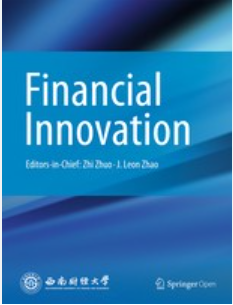The nexus between the volatility of Bitcoin, gold, and American stock markets during the COVID-19 pandemic: evidence from VAR-DCC-EGARCH and ANN models
IF 7.2
1区 经济学
Q1 BUSINESS, FINANCE
引用次数: 0
Abstract
The spread of the coronavirus has reduced the value of stock indexes, depressed energy and metals commodities prices including oil, and caused instability in financial markets around the world. Due to this situation, investors should consider investing in more secure assets, such as real estate property, cash, gold, and crypto assets. In recent years, among secure assets, cryptoassets are gaining more attention than traditional investments. This study compares the Bitcoin market, the gold market, and American stock indexes (S&P500, Nasdaq, and Dow Jones) before and during the COVID-19 pandemic. For this purpose, the dynamic conditional correlation exponential generalized autoregressive conditional heteroskedasticity model was used to estimate the DCC coefficient and compare this model with the artificial neural network approach to predict volatility of these markets. Our empirical findings showed a substantial dynamic conditional correlation between Bitcoin, gold, and stock markets. In particular, we observed that Bitcoin offered better diversification opportunities to reduce risks in key stock markets during the COVID-19 period. This paper provides practical impacts on risk management and portfolio diversification.COVID-19 大流行期间比特币、黄金和美国股市波动性之间的联系:来自 VAR-DCC-EGARCH 和 ANN 模型的证据
冠状病毒的传播降低了股票指数的价值,压低了包括石油在内的能源和金属商品价格,并造成全球金融市场的不稳定。在这种情况下,投资者应考虑投资更安全的资产,如房地产、现金、黄金和加密资产。近年来,在安全资产中,加密资产比传统投资更受关注。本研究比较了 COVID-19 大流行之前和期间的比特币市场、黄金市场和美国股指(标准普尔 500 指数、纳斯达克指数和道琼斯指数)。为此,我们使用动态条件相关指数广义自回归条件异方差模型来估计 DCC 系数,并将该模型与人工神经网络方法进行比较,以预测这些市场的波动性。我们的实证研究结果表明,比特币、黄金和股票市场之间存在显著的动态条件相关性。特别是,我们观察到,在 COVID-19 期间,比特币为降低主要股票市场的风险提供了更好的多样化机会。本文为风险管理和投资组合多样化提供了实际影响。
本文章由计算机程序翻译,如有差异,请以英文原文为准。
求助全文
约1分钟内获得全文
求助全文
来源期刊

Financial Innovation
Economics, Econometrics and Finance-Finance
CiteScore
11.40
自引率
11.90%
发文量
95
审稿时长
5 weeks
期刊介绍:
Financial Innovation (FIN), a Springer OA journal sponsored by Southwestern University of Finance and Economics, serves as a global academic platform for sharing research findings in all aspects of financial innovation during the electronic business era. It facilitates interactions among researchers, policymakers, and practitioners, focusing on new financial instruments, technologies, markets, and institutions. Emphasizing emerging financial products enabled by disruptive technologies, FIN publishes high-quality academic and practical papers. The journal is peer-reviewed, indexed in SSCI, Scopus, Google Scholar, CNKI, CQVIP, and more.
 求助内容:
求助内容: 应助结果提醒方式:
应助结果提醒方式:


